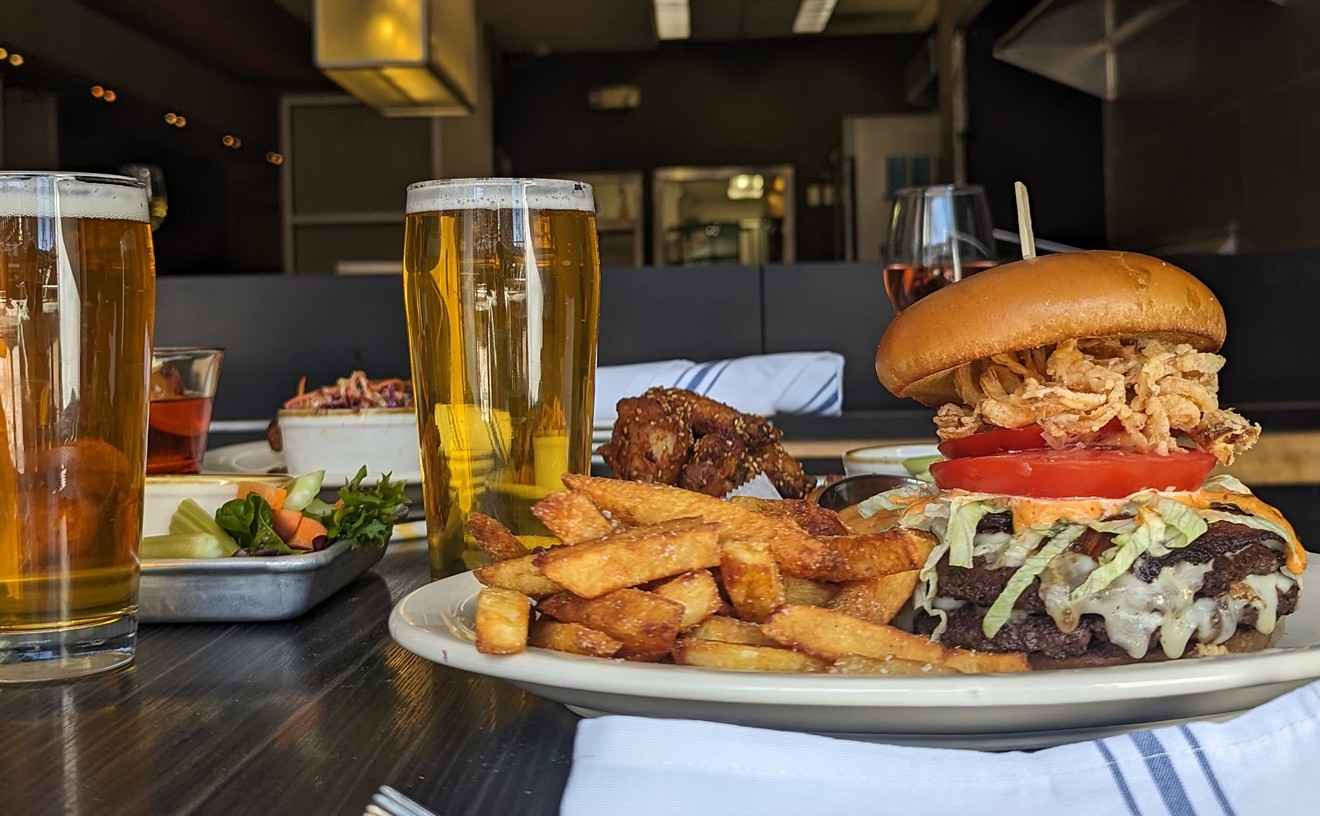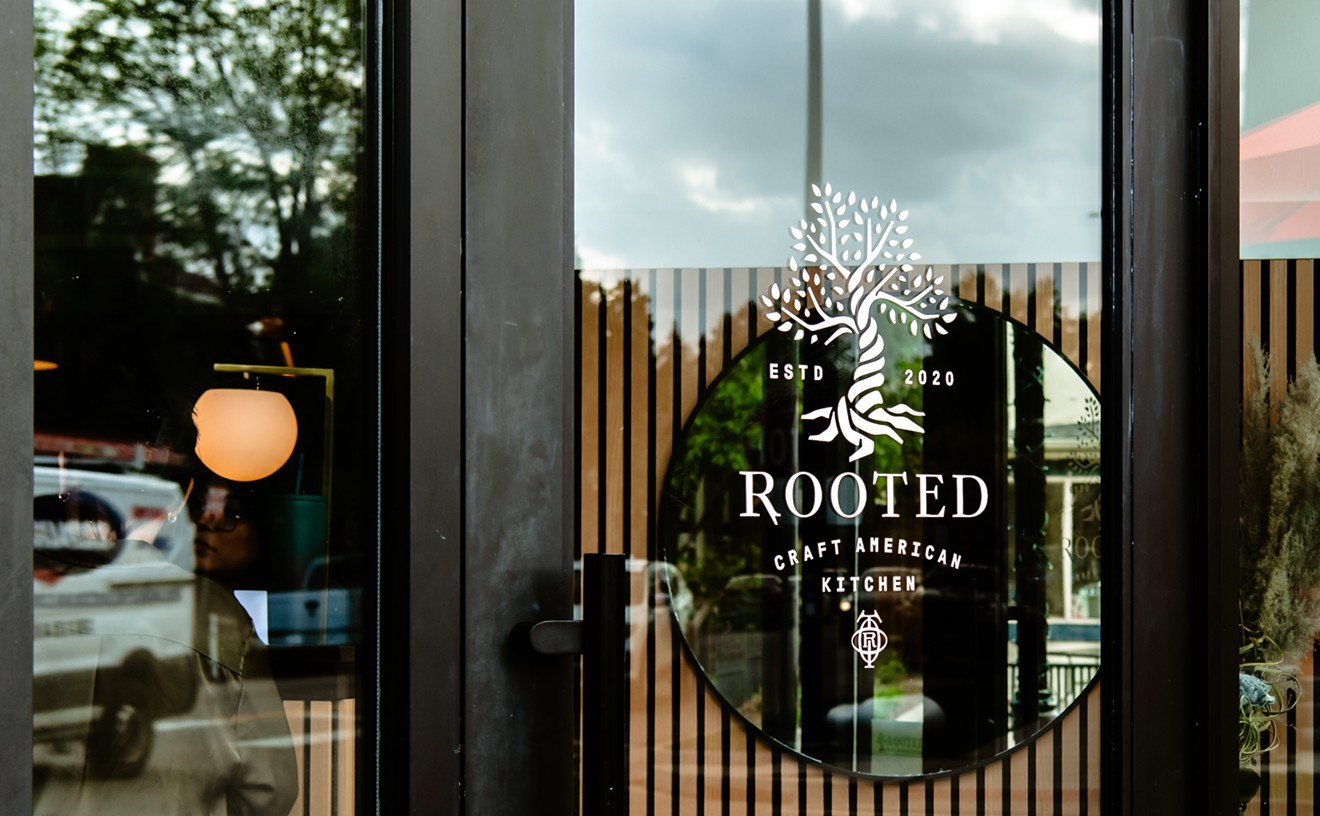It begins in the cool Pacific waters off the northwest coast, where Mr. Swordfish finds himself the victim of a nasty sting operation--he's wanted in fifty states for possession of cholesterol-lowering omega-3 fatty acids, and the net has been cast far and wide. Sometime after 5 p.m., the accused is reeled in--along with several innocent, albeit trash, fish. In the ensuing struggle, Mr. Swordfish finds his belly pumped full of...ice. He's thrown in the cooler and kept at a temperature between 28 and 32 degrees. Although he won't freeze (sea water's high salt content ensures that), before the night is over he will wind up in a body bag.
Quite a few people will be interested in his remains, including the Seattle Fish Company, one of Denver's ten or so fish wholesalers.
The statute of limitations on Mr. Swordfish is three to five days from capture. That's all the time a place like Mesquite House East will give its purveyors, among them the aforementioned Seattle Fish, to deliver the goods. The time frame is much the same for the other seafood Mesquite House has on the line, says Tony Baroni, a spokesman for Seattle Fish whose family happens to run a fleet of boats off San Pedro, California. "I've seen how the operation works from several different views, and I can promise you that Denver is in a great position for getting fresh, fresh fish," Baroni says.
Seattle Fish trolls as far away as New Zealand, although it concentrates on both U.S. coasts up into Canada, as well as the Gulf Coast and the fish farms between. For farmed fish--catfish, trout, salmon and striped bass are among the varieties that come from commercial fisheries rather than the wild--Seattle Fish's modus operandi is slightly different: Specific orders are placed beforehand, and the fish are neatly packed into Styrofoam boxes, ready for delivery. With a catch like Mr. Swordfish--which weighed upwards of 150 pounds--Seattle Fish takes care of the butchering and divvies the portions between its customers.
For Robert Zamani (a co-owner of Mesquite House, he manages the place and does the cooking while his wife, Wendy, tends to the cash register and a million other things), the crucial issue is that Mr. Swordfish be brought to a speedy, and heated, trial. "I've turned away fish I thought didn't arrive in the best shape," he says.
Baroni has, too: "Sometimes the proper temperature isn't maintained and the fish arrives warm. We say, `Get it the heck outta here.'" The sea water in which the wild fish is transported, from boat to plane to truck, is the key to its quality. "Since the salt keeps it from freezing, the temperatures necessary to prevent bacterial growth can be maintained without ever putting the fish in a frozen state," he adds. "It arrives in the same shape as when the boat pulled it from the water."
What his customers do with the fish after that is out of Baroni's hands.
What Mesquite House does is fire up the mesquite-filled, open-pit-style grill (adding a little hickory for flavor) and start grilling the suspect.
The swordfish ($10.95) is one of the highest-priced items on the menu. The eleven-buck tab can catch you off guard, given the self-serve setup and only-slightly-better-than-Long-John-Silver's atmosphere that prevails at Mesquite House. But the place is clean and casual, the busperson is incredibly friendly--and you get a lot of food for your money. The swordfish steak hung over the edge of the plate, and aside from some chewy edges, the meat was soft and juicy, with just enough smoky flavor. An equally generous portion of king salmon ($10.95) suffered from the same dry edges but benefited even more from mesquite's ability to heat the fish quickly and lock in its juices; the ultra-fresh-tasting fillet's center had soaked up the wood's toasty smoke like a sponge.
Like the rest of the dinners (which, along with sandwiches, are available day and night), these came with coleslaw and a choice of home fries, new potatoes or rice. We tried both potato options: the thick-cut french fries cooked in no-cholesterol vegetable oil and the new potatoes, dripping with butter and so tender they fell apart as soon as we touched them with a fork. The coleslaw was excellent, too, a combination of red and green cabbages with a good balance of mayonnaise and black pepper.
The balance between the squishy and crunchy parts of the crab cakes ($9.95) was another story. According to Zamani, the recipe came from the Dutch gentleman who started Mesquite House in 1989; it calls for a mixture of Canadian snow crab, mustard, thyme and sage dunked in beer batter and deep-fried. But the interior of our cakes was so soggy that it disintegrated when the crusty exterior gave way, and the contrast in textures was unsettling. The flavor, however, was all top-quality crab and pleasantly heavy on the thyme.
Texture is also an important consideration for squid, and Mesquite House's fried calamari ($4) more closely resembled firm-fleshed fish than the rubber-bandy bits of cephalopod served in most places. Zamani attributes this success to the fact that he uses only strips from the body cavity--no heads or tentacles. The squid strips are washed in egg and coated with a tempuralike breading before a quick frying.
When we returned for lunch, Zamani dispensed with the breading altogether for our fish sandwiches. The mahi mahi ($4.85) and the Pacific red snapper ($4.95) are flagged as "heart healthy," making them good alternatives for what typically can be artery-clogging fried affairs. The sesame-seed-studded buns were thick enough to withstand the juices flowing from the delicious fish, and the simplicity of the presentation highlighted seafood still in its prime. We also split a pint of the Manhattan chowder ($3.25), which Zamani kindly divided between two bowls. The chowder is his recipe, a tomato-based stew choking with pieces of potato with the skin still on, as well as clams and chunks of an indeterminate fish that added a just-from-the-sea kick of flavor.
When we ventured further inland, though, we encountered a few problems. The soda machine (forget the low-grade wine list) wasn't properly calibrated, and our drinks were as flat as a calm sea; the key lime pie ($2.75), which isn't made on the premises, arrived frozen; napkins and salad dressing (for a standard iceberg-cucumber-tomato dinner salad) had to be pried out of the busy, behind-the-counter kitchen.
But at a place that serves fish this fresh, those flaws are no more than petty misdemeanors.










